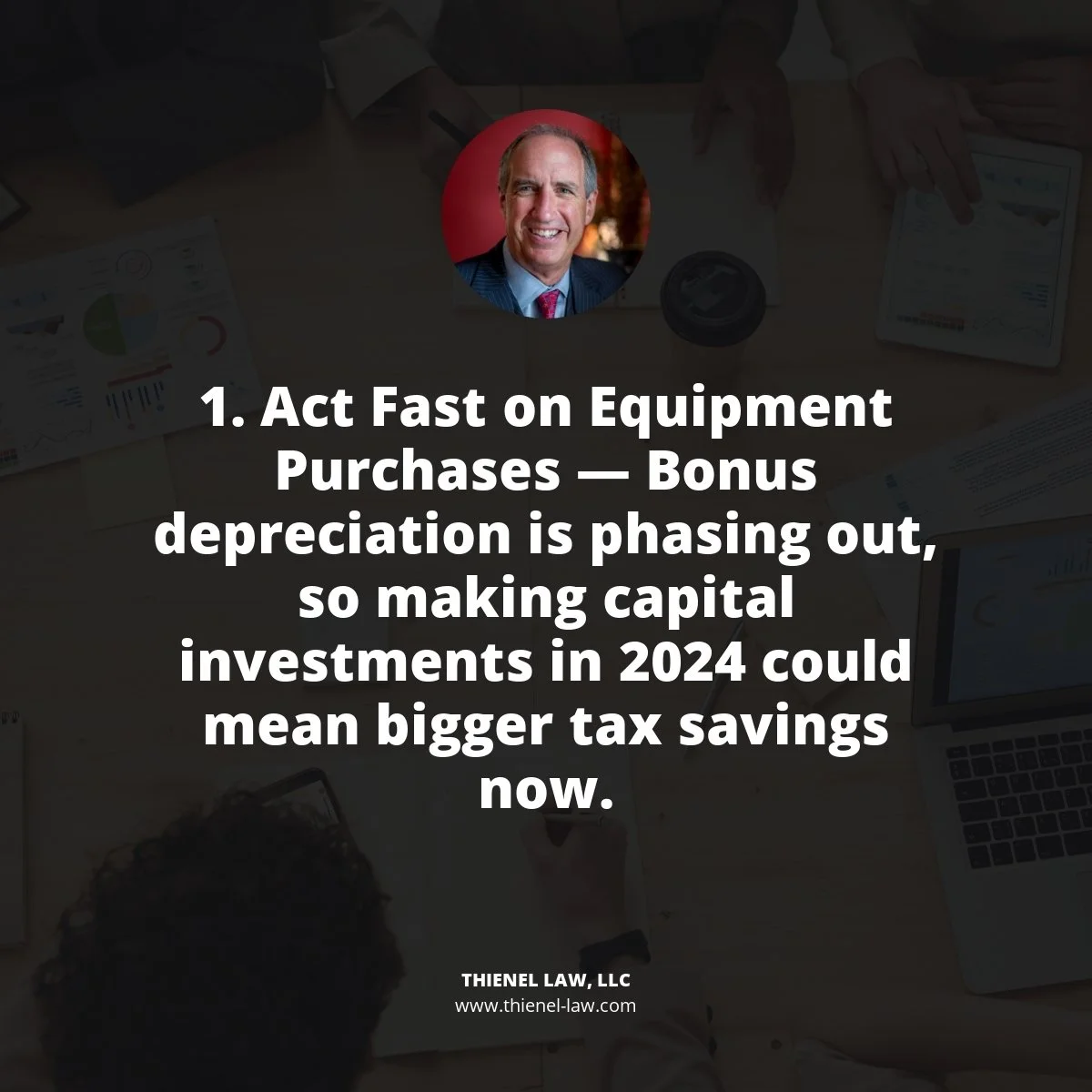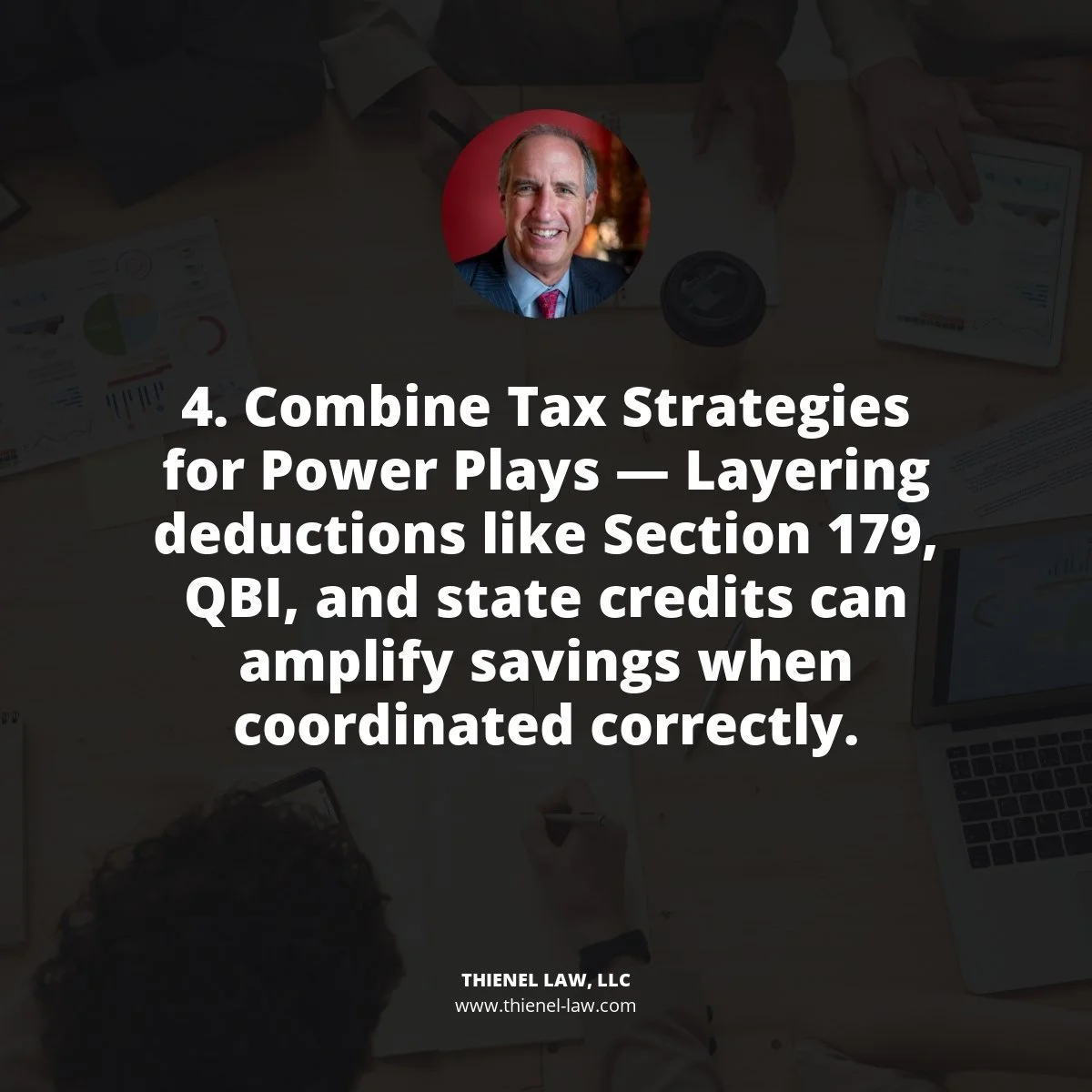Capital Cost Recovery and What It Means for Your Business: Lessons from Canada's Tax Policy Shift
Key Takeaways
Canada plans to phase out full expensing provisions in 2028, which could significantly decrease its attractiveness to investors
Full expensing reduces tax burdens and accelerates capital investment—key factors for U.S. business planning, especially for equipment-heavy industries
The U.S. is also phasing out its 100% bonus depreciation, and similarities in policy trends can affect businesses in Maryland, Virginia, and D.C.
Small business owners and high-net-worth individuals should consider long-term tax planning strategies now, before policy shifts impact future deductions
Understanding capital cost recovery can uncover tax-saving strategies through entity selection, asset structuring, or estate planning
Shrinking Tax Deductions
Why Capital Cost Recovery Policy Shifts Matter
Business owners, professionals, and investors in the DMV region know the value of staying ahead of tax policy. Every change in law—whether federal or foreign—ripples through financial decision-making. Canada's recent signaling around its capital cost recovery provisions is one such shift worth watching.
If Canada doesn't make its temporary full expensing provisions permanent, its global ranking in capital cost recovery efficiency will fall dramatically by 2028. While this appears to be a Canadian issue on the surface, it raises important questions for U.S. businesses: How should you plan for taxable depreciation? Are your capital expenditures aligned with the most tax-efficient incentives? How will similar changes in U.S. tax law—like the scheduled phase-out of full bonus depreciation—affect your bottom line?
We explain the concept of capital cost recovery, its implications for your business structure or estate plan, and how to strategize now so your tax plan doesn't lag behind policy changes.
What Is Capital Cost Recovery—And Why Should You Care?
Capital cost recovery refers to the ability of a business or taxpayer to deduct the cost of long-lived assets—such as machinery, vehicles, or industrial equipment—over time. The faster you can recover (i.e., deduct) that cost from your taxable income, the more cash flow your business retains in the short term. This directly impacts your ability to reinvest, remain competitive, or scale operations.
There are different ways governments allow for capital cost recovery. The most aggressive option—and the one most favorable to business—is full expensing, where you deduct the entire cost of an asset in the year it's placed in service, rather than depreciating it over several years.
Canada implemented a version of full expensing as a temporary tax provision meant to stimulate economic recovery. That provision is set to expire by 2028, and when it does, the country's capital cost recovery ranking will fall to 13th globally. While this may not sound like a headline issue for U.S. businesses, it's a sharp reminder that depreciation rules are political choices—and the U.S. is not immune to similar rollbacks.
The U.S. Policy Environment: Bonus Depreciation Phase-Out
In parallel with Canada, the United States is undergoing its own rollback. The Tax Cuts and Jobs Act of 2017 introduced 100% bonus depreciation for qualifying assets placed in service between 2017 and 2022. However, unless Congress acts, the bonus depreciation rate has already begun phasing down:
80% for assets placed in service in 2023
60% in 2024
40% in 2025
20% in 2026
0% in 2027
This makes 2024 a crucial year for planning major purchases or capital improvements. If your business is considering upgrading equipment, expanding facilities, or investing in new technology, the timing of those expenses could significantly affect how quickly you recoup your investment.
Implications for DMV-Area Businesses and High-Income Taxpayers
Let's take this from policy to practice. What does this mean for you as a business owner or investor in Maryland, Virginia, or the District of Columbia?
LLCs and Partnerships
If you operate a pass-through entity, capital expense deductions flow through to your personal income. A weakened capital cost recovery regime years from now could increase your individual tax burden unless you structure purchases strategically.
S-Corps
S-Corporation owners should pay extra attention to timing on asset purchases. The phasing out of bonus depreciation can shift the balance on whether to lease or buy.
High-net-worth Individuals
Many high earners hold substantial business assets inside holding companies or real estate structures. Proper use of legacy depreciation strategies—like Section 179 expensing or multi-entity planning—can continue to deliver tax efficiencies, but only with proactive planning.
Estate Planning
Gifting depreciable business assets as part of your estate plan? Knowing how those assets are valued—based in part on remaining depreciation—can affect both estate tax and future beneficiary planning.
Tax Planning Strategies to Consider Now
With policy uncertainty, timing is everything. Here are a few strategies savvy business owners and investors should consider while bonus depreciation and favorable expensing provisions remain partially intact:
1. Accelerate Capital Expenditures
If your business is due for new equipment or infrastructure upgrades, accelerating those purchases into 2024 or 2025 could enable you to capitalize on still-available bonus depreciation.
For example, a Maryland-based manufacturing firm planning to buy a $750,000 CNC machine in 2025 might consider fast-tracking the purchase to secure the 60% bonus depreciation available in 2024. This could result in substantial savings that improve working capital.
2. Analyze Lease vs. Buy Decisions
With bonus depreciation phasing out, leasing assets may start to look more attractive than purchasing—especially if the tax deduction associated with capital purchases becomes less significant. But it depends on the nature of the lease and the length of time you plan to hold or use the asset.
3. Reconsider Entity Structure
Different entity types treat depreciation differently. In some cases—especially for new ventures or those planning for a liquidity event—it may make sense to form a separate LLC for equipment-heavy operations, so you can isolate and control the treatment of those assets for tax purposes.
4. Layer Tax Strategies
Many businesses miss opportunities to combine bonus depreciation with other deductions, such as the Section 179 expense, Qualified Business Income (QBI) deductions under Section 199A, or state and local tax planning. Coordinating these strategies can compound savings.
5. Plan for Phase-Out Triggers in Your Tax Forecasting
Many decision-makers fail to model what reduced depreciation will look like over the life of an asset. Update your tax forecasting to account for lower deductions in coming years so you don't overestimate future after-tax cash flows.
Unique Insight: Why Global Trends Should Matter to Regional Operators
Canada's movement away from full expensing is a reminder that governments can—and do—change the rules when macroeconomic trends shift. Inflation, budget deficits, or political upheaval often cause tax-friendly subsidies to disappear.
For business owners in the D.C. region—especially those with cross-border interests, international clients, or vendors—it's worth paying attention to these global cues. Knowing what's happening just across the border in Canada may tip you off to what policymakers in Washington consider next.
If full expensing is on the political chopping block in the U.S., businesses that bet on accelerated deductions without a contingency plan may be left holding the tax bill later.
Risk Management and Compliance Considerations
For companies with significant capital investment, documentation is key. When claiming deductions via bonus depreciation or Section 179, ensure equipment and machinery is placed in service before year-end and that documentation supports that assertion. IRS audits in recent years have become more aggressive in reviewing "placed in service" claims.
Additionally, large capital expenditures should be supported by board resolutions, purchase contracts, and maintenance logs. If you're shifting strategies away from owning to leasing, be sure contracts are reviewed by counsel—many operating leases today blur the line between true leases and capital purchases in IRS interpretation.
What Business Owners Should Do Now
Whether you're managing a family business, operating a professional services firm, or partnering in a capital-intensive venture, these shifts in depreciation policy should factor into your tax planning for the next 3–5 years. Don't assume that deductions will always be as generous as they are today.
Speak with a qualified tax attorney—not just a CPA—to examine how your business structure, acquisition strategy, and estate plan mesh with evolving tax law. Flexibility is key. Without a well-coordinated strategy, you may find that your tax policy assumptions no longer align with reality—and that could cost you not just money, but growth potential.
Let's Make Your Tax Strategy Work Harder for You
Capital cost recovery rules are changing, both in Canada and in the U.S. If you're unsure how this applies to your business or personal situation, we're here to help. Schedule a consultation with Steve Thienel to get advice tailored to your goals. We can analyze your tax position, help you time your investments, and ensure your business remains efficient and compliant through future tax cycles.
Don't wait for policy changes to catch you off guard — proactive planning starts today.






